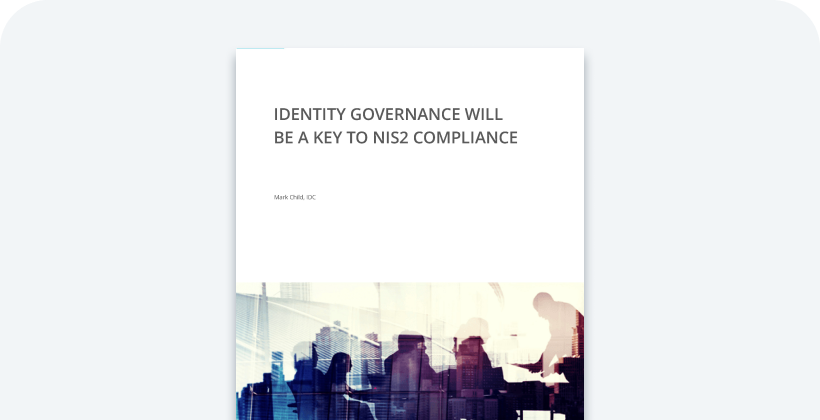Compliance
NIS2: Secure identities and ensure compliance
The average NIS2 compliance process takes approximately 12 months. The time to start your compliance journey is now.
Overview
The NIS2 directive: ensuring compliance
The NIS2 Directive, also known as the revised Directive on Security of Network and Information Systems, is an updated piece of EU-wide legislation enacted by the European Union (EU). The directive aims to combat rising cyber threats and improve the resilience of the cyber security framework across EU member states.
We partnered with IDC (International Data Corporation) on a Technology Spotlight Report to uncover key insights on how identity security will play a central role in helping organisations attain NIS2 compliance. Leveraging decades of experience, IDC’s spotlight report offers great insight into understanding your organisation’s competitive landscape, adopting best practices and helping your business ensure compliance.
Threat landscape: 50% of European organisations saw an increase in the volume of cyberattacks in 2022.
Security strategy: 59% of European organisations have adopted a strategic approach to building cyber resilience, but only 47% have done so for the adoption of zero trust models and principles.
Managing identity: A third of organisations struggle to manage identities and access as they shift to cloud platforms and cloud-native apps.
The NIS2 directive will impact more organisations in more sectors and extend to midmarket entities.
Senior management may be held liable for infringements. It is crucial that they take an informed, proactive, and engaged approach to NIS2 implementation.
Benefits
Leverage identity security in ensuring NIS2 compliance.
Identity security is crucial to the successful implementation of the NIS2 Directive. Creating a strong security risk posture starts by managing user identities, access rights, and privileges within your organisation's network and information systems. By adopting identity security practices, organisations can:
Mitigate cyber risk
Identity security enables your business to establish comprehensive identity and access management frameworks. By implementing strong authentication mechanisms, role-based access controls, and least privilege principles, organisations can significantly reduce the risk of unauthorised access and insider threats.
Ensure compliance
The NIS2 Directive mandates organisations to demonstrate compliance with security requirements and ensure that enterprises have the right tools in place to report possible security incidents. Identity security facilitates enterprises to establish auditable processes and controls, ensuring compliance with regulatory standards and enabling the accurate reporting of security incidents.
Manage incident responses
In the event of a data breach or security incident, identity security enables organisations to rapidly respond and mitigate the threat. By maintaining accurate user and access data, organisations can quickly identify and isolate compromised accounts, reducing the spread of the security incident and accelerating the recovery process.
Enhance accountability and auditing
Identity security provides a centralised view of human and non-human user activities, allowing organisations to monitor and track user behaviour. This capability enhances accountability, assists in investigations, and supports regulatory audits, aligning in sum with the transparency requirements laid out by the NIS2 Directive.
Customer Stories
Leading companies count on SailPoint for identity security
RESOURCES
Learn how SailPoint can help you become NIS2 compliant
Are you ready for NIS2?
Discover how NIS2 compliance impacts your organisation.
FAQ
Frequently asked questions
What is the NIS2 Directive?
The NIS2 Directive, or the revised Directive on Security of Network and Information Systems, is legislation enacted by the European Union (EU) to establish a harmonized and resilient cybersecurity framework across member states. It aims to enhance the security and resilience of essential services in sectors such as energy, finance, transportation, healthcare, and digital infrastructure.
What deadlines are associated with the NIS2 Directive?
The NIS2 directive entered into force on January 16, 2023. Member States are given 21 months, until 17 October 2024, to ensure that its measures are transposed into national law. The deadline, 17th October 2024, is crucial for organisations as non-compliance can lead to financial penalties and possible restrictions on providing services.
What sectors are affected by the NIS2 Directive?
The NIS2 Directive applies to operators of essential services in various sectors, including energy, transportation, banking, finance, health, water supply, digital infrastructure, public administration, digital providers, postal services, waste management, space, foods, manufacturing, chemicals and online marketplaces.
What is the difference between NIS2 and GDPR?
The NIS2 Directive primarily focuses on preventing and mitigating cyber threats and incidents, incident reporting, and cooperation between member states. It applies to operators of essential services and digital service providers in various sectors, aiming to ensure the protection of critical infrastructure. Conversely, GDPR (General Data Protection Regulation), focuses on protecting the privacy and personal data of individuals. It applies to all organisations that process personal data of individuals residing in the European Union, regardless of the industry or sector.
What are the key objectives of the NIS2 Directive?
The main objectives of the NIS2 Directive include:
- Enhancing the scope by covering a wider range of digital service providers.
- Mandating incident reporting to competent national authorities.
- Setting security requirements for organisations to protect network and information systems.
- Encouraging cooperation and information sharing among EU member states.
How does identity security relate to the NIS2 Directive?
Identity security plays a crucial role in the implementation of the NIS2 Directive. It involves managing and controlling user identities, access rights, and privileges within an organisation's network and information systems. Identity security helps organisations mitigate risks, achieve compliance, facilitate incident response, and ensure accountability and auditing, all aligned to the requirements of the directive.
What are the penalties for non-compliance with the NIS2 Directive?
The penalties for non-compliance with the NIS2 Directive vary across member states. However, organisations failing to comply with the directive's provisions may face financial penalties, reputational damage, and potential restrictions on providing services. Importantly, the NIS2 Directive imposes direct obligations and liability on senior management for companies in scope. Essentially, senior management individuals may be held liable for infringements. As a result, it is crucial that they take an informed, proactive, and engaged approach to NIS2 implementation. Additionally, it is essential for organisations to understand and adhere to the specific requirements and obligations set forth by their respective national authorities.
Is the NIS2 Directive applicable outside the European Union?
The NIS2 Directive is specific to the European Union member states. However, organisations operating outside the EU may still be affected if they provide digital services or have connections with entities covered by the directive within the EU. It is advisable for such organisations to assess their obligations and ensure compliance with applicable cybersecurity regulations in their respective jurisdictions.
Does the NIS2 Directive apply in the United Kingdom, since it’s out of the EU due to Brexit?
The government of the United Kingdom has confirmed that it will move forward with plans to update the NIS regulations as they apply to the UK, extending the regulation to include all digital managed service providers (MSPs).
I am an IdentityIQ / IdentityNow customer, am I NIS2 compliant?
Although SailPoint’s Identity Security platform plays a crucial role in overall security and compliance efforts, it is not the sole factor in achieving NIS2 compliance. NIS2 covers a broad range of requirements which involves multiple components, including risk management, incident response, security measures, reporting obligations, and more. Organisations need to implement a comprehensive set of security controls and practices to meet the specific requirements outlined in NIS2. Click here to download the NIS2 Spotlight Report and learn how SailPoint can support your journey to becoming NIS2 compliant.
Get Started
See why SailPoint identity security is key to ensuring NIS2 compliance
Discover how our solutions enable modern enterprises today to meet the challenge of ensuring secure access to resources without compromising productivity or innovation.


